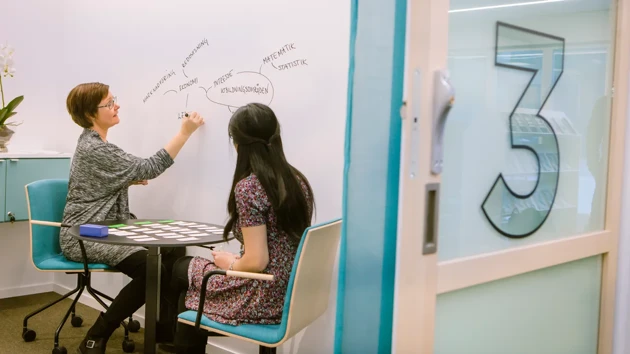Current Trends and a Minor in Accounting 30 credits
About the course
The course gives the opportunity to further develop within the major subject in a module on the latest development and in a module on research methodology. The course also gives a Minor subject in Accounting. The course is given an examined in English.
- Module 1. Research Methodology in Business Research, 7,5 credits
- Module 2. Advanced Management Accounting, 7.5 credits
- Module 3. Advanced Financial and Sustainability Reporting, 7.5 credits
- Module 4. Current Trends in Business Administration 7,5 credits
Common expected learning outcome:
- communicate central concepts for the course in English, both orally and in writing
Module 1. Research Methodology in Business Research, 7,5 credits
The overarching aim of this course is to develop advanced knowledge of perspectives, strategies and design in research. This will increase the student's ability to carry out and assess business research and investigations. Important building blocks are the problem formulation, frames of reference, scientific approaches, including the ontological and epistemological points of departure, and methods for data collection and analysis.
Expected learning outcomes
After completing the module, the student should be able to:
- identify and discuss how fundamental assumptions, scientific ideals, perspectives and frames of reference influence a process of scientific knowledge creation.
- formulate and argue for relevant research questions, including the theoretical relevance and positioning.
- discuss characteristics of research strategies and discuss and evaluate the suitability of qualitative, quantitative, and mixed methods respectively, to solve different research questions.
- apply acquired knowledge in the planning, design, implementation and reporting of scientific studies.
- demonstrate an ability to assess and discuss social, environmental and ethical aspects of the business research process.
Focus of instruction
Lectures, seminars, practical assignment(s), individually or in groups, and the reading material complement each other to help students to develop deep knowledge of what scientific research in business and management fields is all about.
Examination modes
The assessment is based on an individual written hall exam and reporting of individual written assignment(s). Participation at all seminars and presentations is compulsory to pass the module. The final grade is awarded when the student has passed all assignments and compulsory module elements. The course is given and examined in English. Note as well examination modes for the course below.
Module 2. Advanced Management Accounting, 7.5 credits
Management accountants are strategic financial management professionals who integrate accounting expertise with advanced management skills to drive business performance, with the postulate that the sustainability of a firm depends on its ability to recognize and benefit from its value drivers. With a solid theoretical framework, the course addresses modern issues in management control and performance measurement. The focus is on the enhancement of shareholder value through customer-driven value creation from a value-based management perspective. A second purpose of the course is to enhance students' knowledge and analytical skills related to the way managers design, and utilize planning and management control systems to implement strategies. Techniques of the management control process are studied, and behavioural considerations are discussed. The management accounting systems studied should provide information on the value drivers of organizations, to assist in aligning the self-interests of management with long-term shareholder wealth. The students will also become aware of the varied and changing roles of the management accountant. During the module, students will also be introduced to methods of working in international teams. The contents of the course are intended to prepare the students toward the FMAA (Financial and Managerial Accounting Associate) and the CMA certification (Certified Management Accountant), both delivered by the IMA (Institute of Management Accountants).
Expected learning outcomes
After completing the module, the student should be able to:
- explain the meaning and significance of management accounting and control and discuss factors that make management accounting and controlling systems differ.
- evaluate how company goals and factors in the environment such as stability, certainty, complexity and national culture influence the management accounting system.
- discuss the relationship between decentralization and management accounting and analyse the challenges of transfer pricing.
- apply management accounting processes: strategic planning, costing, budgeting, sustainability reporting, designing performance measurement and incentive systems.
- analyse the specific challenges to the design of management accounting systems in not-for-profit organizations, in the provision of services and in temporary project organizations.
- integrate management accounting within sustainability strategy.
Focus of instruction
The developments of the management accounting subject, techniques and concepts are presented during lectures. Requiring reading for the module includes cases, chapters, and articles contained in the assigned textbooks and supplementary materials. Students are expected to take an active part in discussions on the development of the field, literature and article seminars and reporting about case studies. They will be given a number of assignments, leading to continuous assessment. Course work will be done individually and in small groups. Course work must reach an advanced level of knowledge and understanding of the subject.
Module examination modes
Examination is based upon a written individual hall exam and written group assignments with oral presentation. A passing grade is required for each part of the module. The course is given and examined in English. Note as well examination modes below for the course as a whole.
Module 3. Advanced Financial and Sustainability Reporting, 7.5 credits
The module develops students' abilities to prepare and analyse financial and sustainability reports. It focuses on the reporting in large companies and develops students' abilities to handle also more complicated accounting issues. The module covers financial and sustainability reporting from an international perspective as it focuses on the International Financial Reporting Standards and sustainability standards used in the European Union.
Expected learning outcomes
After completing the module, the student should be able to:
- apply IFRS accounting standards, in both moderately difficult and more advanced situations.
- assess the consequences of different options in relation to accounting-method choices and approaches used for making estimates in accounting.
- apply the European Union's and the International Sustainability Standards Board's regulations when preparing sustainability reports.
- make materiality assessments in the financial reporting and sustainability reporting.
Focus of instruction
Learning is supported by lectures, practically oriented exercises, teacher-led case-discussions and tutoring sessions.
Module examination modes
The examination is based on a written individual hall exam and cases. The case-assignments are solved in groups and the assessment is based the students-group' submissions and the students' activity in the teacher-led case-discussions. Note as well examination modes for the course below.
Module 4. Current Trends in Business Administration 7,5 credits
The ambition of this module is to identify and uncover current trends. These trends have a strong long-term impact on society at large and thus form future premises and give rise to challenges for businesses. The aim of the module is to explore how business and society interact to tackle such present and future challenges. The expectation is that students participating in this module are well equipped with knowledge and skills related to their own major, one of the five sub-disciplines accounting, entrepreneurship, finance, management, and marketing in Business Administration.
Expected learning outcomes
After completing the module, the student should be able to:
- analyse fundamental societal issues and what impact businesses have on these issues.
- identify and evaluate emerging trends in society.
- critically discuss business decisions relating to current trends.
- evaluate information, knowledge and policy in relation to current trends in terms of validity and reliability.
- relate current trends to research in business administration within the field of the student's major.
- be able to share multidisciplinary knowledge.
Focus of instruction
Learning is supported by lectures, guest lectures and guided exercises. Students are provided with relevant sources of information and scientific literature for supporting individual and group works related to the themes of lectures and exercises.
Module examination modes
The main mode of examination is an individual written essay with a subsequent oral examination. The essay requires convincing discussion of the importance and urgency of solving a specific problem related to any of the current trends from the disciplinary perspective of the student's major. Further, the examination consists of individual and group reflection papers related to the various course activities.
Attendance at all work in progress and final presentation seminars, group work and guest lectures related presentation events are mandatory and thus a requirement to pass the course. A passing grade for each graded part of the course is required to pass. The course is given and examined in English. Note as well examination modes for the course below.
This course is part of a programme
This course contains occasions that are included in a degree programme at Umeå university and applies only to those of you who are admitted to the programme. You will receive information about application times and what applies to you from your institution.
Apply
-
Autumn 2026
-
Current Trends and a Minor in Accounting
Offered as a part of a Degree programme
HT26 / Umeå / English / On site
Application opens 16 March 2026Show more Show less
Starts31 August 2026
Ends17 January 2027
Number of credits30 credits
Type of studiesOn site
Study pace100%
Teaching hoursDaytime
Study locationUmeå
LanguageEnglish
Application codeUMU-2F00P
Eligibility90 credits whereof 30 credits at advanced level in Business Administration. Proficiency in English equivalent to Swedish upper secondary course English 6/level 2.
SelectionGuaranteed place, only SAACM, SAMAM, SAMGM, SAAIM, SAFIM
ApplicationThe online application opens 16 March 2026 at 09:00 CET. Application deadline is 15 April 2026.
Application and tuition feesAs a citizen of a country outside the European Union (EU), the European Economic Area (EEA) or Switzerland, you are required to pay application and tuition fees for studies at Umeå University.
Application fee: SEK 900
Tuition fee, first instalment: SEK 48,300
Total fee: SEK 48,300
-
How to apply
Apply online via universityadmissions.se
You apply to our programmes and courses via universityadmissions.se – the official website for higher education applications in Sweden. There, you can track your application, check that your documents have been registered, and log in to find our your admission results.
Late applications
Admissions to most programmes and courses typically close after the final application deadline. However, some programmes and courses may still accept late applications if seats are available. These are marked “Open for late application” on universityadmissions.se. Please note that late applications are not guaranteed to be reviewed.
More about application and admission
Explore your future at Umeå University
Join a vibrant academic community where high-quality education meets groundbreaking research in science, technology, humanities, and the arts. At Umeå University, you will learn from passionate, expert teachers and benefit from a close connection between research, education, collaboration, and innovation.
-

World's most satisfied international students
#1 globally in the main categories of Living, Support, and Overall Satisfaction.
-

A university with health at its core
Umeå University is certified as a Healthy Campus, with many initiatives that promote health and well-being.
Contact us
Your message goes to Infocenter, and they’ll make sure it gets to the right person – so you get the best and most relevant reply.
Course is given by
Business Administration
Good to know

How to apply
A step-by-step guide to apply for studies at Umeå University.

International Student Guide
Essential information for your journey to Umeå and your studies here.

Study guidance
A study counsellor can help you with many of your study-related questions.